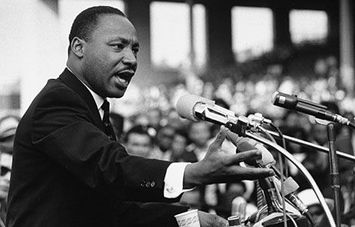Unifying Cultures
"The Gates of Justice" (1969) unified blacks and Jewish people after the 1968 assassination of Martin Luther King, Jr., when tensions were growing between them. This piece emphasized blacks' struggles throughout history, and highlighted the importance of equality.
"It was an emotional time. The idea was to bring these two cultures together, to show similarities rather than their differences."
-Dave Brubeck
"We must stand for freedom. Stand! Knowing that one day we will be free. If we don't live together as brothers, we will die together as fools. We are living in a land of freedom! Shout! Free at last, I'm free at last! Thank God Almighty, we're free at last!" |
"...to bring together—and back together—the Jewish people and American blacks. The natural bond forged between them during the civil rights movement in the early 1960s had weakened and was starting to break down by 1969, especially after the assassination of Martin Luther King, Jr., in 1968."
-Neil Levin, Artistic Director of the Milken Archive of Jewish Music
Scored for jazz trio, brass orchestra, chorus, a Jewish tenor, and an African-American baritone, "The Gates of Justice" was written by Dave Brubeck to fight for civil rights. He wanted to unite the world through this piece, communicating the message of the brotherhood of man.
"Back in 1969, The Gates of Justice expressed Brubeck's identity perhaps more clearly than his poll-topping jazz hits. It addressed an urgent social need. And the piece may also have helped salve resentment toward Brubeck; he achieved a level of success few black jazz musicians attained." |
"...When King said, 'We must live together as brothers,' people didn't hear it. Now they damn well hear it. That's what I'm talking about." |
Jewish tenor Alberto Mizrahi and black baritone Kevin Deas shared their cultural histories filled with suffering.
"Because of their long history of suffering, Jews and American blacks know better than any other people the consequences of hate and alienation. It is impossible to concert oneself with the history and tradition of either without feeling overwhelmed by the inequities and injustices that have pervaded all strata of society. The spiritual and emotional ties, born of suffering, which bind these people together, have much to teach all of us on this shrinking planet."
-Dave Brubeck
"Concentrating on the historic and spiritual parallels of Jews and American blacks, I hoped through the juxtaposition and amalgamation of a variety of musical styles to construct a bridge upon which the universal theme of brotherhood could be communicated." |
"It's always in the front of my mind, that when I sing Jewish music and hazznut, whether on the pulpit or the stage, not only am I preserving the music, but I'm affirming the existence of the Jewish people and the culture that was doomed." |



